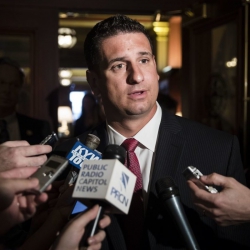Pennsylvania could be on the verge of passing an annual budget complete with online gambling, though the past few months have proven to be frustrating to optimists.
The Pennsylvania House passed a budget bill late Tuesday night.
Prior to Tuesday, House Speaker Mike Turzai and his caucus were seen as the major obstable to a deal. If the House Republicans are willing to cut a deal with Senate Republicans and Democrat Gov. Tom Wolf, then a budget bill might be in the offing.
The revenue package at present does not include online gambling (House Bill 271), but a high-ranking Pennsylvania representative said that Internet gambling is included in principle — though the details of a new online gambling law would be written in the coming days.
Dave Reed: “More Revenue to Follow”
House Majority Leader Dave Reed, second-in-command to Mike Turzai, said of the deal, “Obviously there’s some other components, because you’ve got the gaming bill still sitting in the Senate….This gets the ball really rolling in the right direction. And the gaming bill is a separate proposal, so there’s still more revenue to follow.”
The potential budget deal comes after a week of vacation for the Pennsylvania state legislature. Two weeks ago, talks between the three sides appeared to have fallen through altogether, as they had the previous two years. It was reported widely that Pennsylvania online gambling would need to wait for the future, because Gov. Wolf had announced he would borrow $1.2 billion to keep the state government’s programs running.
Penn Live reported that the full budget package would include “a yet-to-be-determined expansion of legal gambling.”
Online Casinos and Online Poker
Most versions of the Pennsylvania budget bill have included online poker, online casinos, and daily fantasy sports. The various proposals have included other options like VGTs and satellite casinos, but the Internet gaming is the one factor all sides have agreed upon before.
Early in the day Tuesday, it was thought the Pennsylvania budget bill would be brought to the House floor for a full vote. It was learned that no procedural votes could be called until the evening, so budget talks were tabled for most of the day. Still, the idea that a vote would happen meant that House leaders believed they had the votes to pass a bill.
House Budget Passed 102-88
Neither Governor Tom Wolf nor Senate Republicans committed to the bill, though, so it was uncertain how much support the bill would have. It passed with a 102-88 margin. Details are sparse, but Philly.com reported the full budget funding would include “another $200 million from expanded gambling — the details of which have yet to be worked out.”
One version of an omnibus gambling bill included a $200 million proposal for revenues from online gambling, so the figure reported by Philly.com could be pivotal. Other versions called for a $100 million gambling package, while early versions of H 271 allowed as much as $700 million from gambling and alcohol expansion.
Budget Bill Moves to Pennsylvania Senate
The next few days should prove pivotal. The House budget bill next goes to the Pennsylvania Senate, where Senate Majority Leader Jake Corman will try to pass a version of Turzai’s proposal. If that passes, then Governor Tom Wolf would need to sign the bill into law. Given the narrow majority the House passed the measure, Gov. Wolf’s veto would kill the Pennsylvania budget bill.
Update: Senate Passes Budget Bill, Governor Wolf Signs into Law
In an update, the Pennsylvania Senate passed a budget bill on Wednesday, October 25. The two bills were not identical, so leaders on either side negotiated on a final version of the twin bills throughout the latter parts of the week and on through the weekend. On Monday, October 29, a bill was presesented to Gov. Tom Wolf.
Governor Wolf signed that bill, thus presenting Pennsylvania with its first comprehensive budget bill in three years. More importantly for the US online gambling community, Pennsylvania became the fourth US state to legalize, license, regulate, and tax online casinos and poker sites. After four years of disappointment, US legal online gambling is once again expanding.

